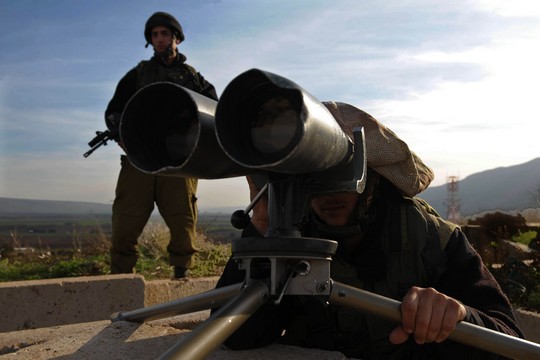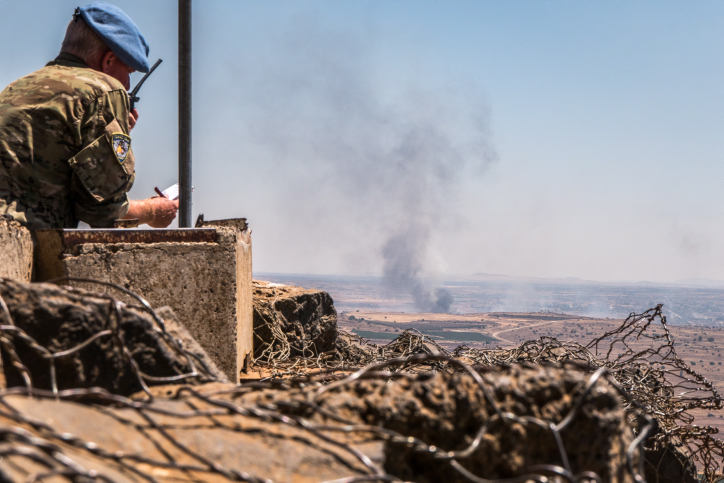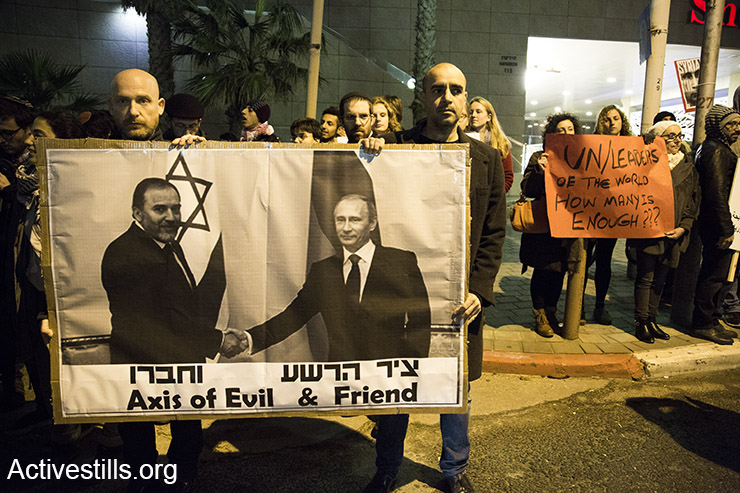Increasingly hawkish rhetoric directed at Hezbollah, along with providing humanitarian aid to Syrian rebels, may lead Israel into a war no one wants. Israel’s interest is a stable Middle East, but it won’t happen without an end to the occupation.
By Asher Kaufman

At the annual Herzliya Conference last week, the head of the Israeli Military Intelligence Directorate, Maj. Gen. Herzi Levi, told the crowd that “Iran, the Assad regime, and Hezbollah — these are the main threats in the region… and a major threat to the State of Israel.” Levi added that “one can clearly see Hezbollah building a military industry with Iranian knowledge, creating weaponry and transferring them to southern Lebanon.” At last year’s conference, Levi, along with military officials and politicians, made similar comments about the threat posed by the Iran-Assad-Hezbollah axis, adding that another round of fighting between Hezbollah and Israel is an inevitability.
Hassan Nasrallah does his part and threatens Israel morning and night, warning that during the next, inevitable war, all of Israel’s territory will be exposed to Hezbollah’s rockets, and that the organization may even manage to conquer parts of the north. In a speech delivered on “Quds Day,” Nasrallah added that thousands of Muslim volunteers from across the world will join the fight against Israel. It seems that both sides partake in a ritual of lobbing threats back and forth over the coming war, which will lead to the ultimate demise of the other side. Even though neither side have an immediate interest in going to war — Hezbollah is still neck-deep in the Syrian Civil War, and Israel is happy to maintain more than a decade of quiet in the north – wars rarely break out due to careful calculations on the part of one of the sides.
The cost of Israeli involvement in Syria
The latest spillover in the Golan Heights makes clear the danger on Israel’s northern border. Much of the border with Syria across the Golan Heights is still in the hands of the opposition, and in the last months the Assad regime and its allies have been diverting some of their military resources to take control of the area. Despite the fact that Israel officially repeats the mantra that it does not get involved in the Syrian Civil War, it is an open secret that it provides aid to some of the opposition groups near the Golan Heights. Recently, Fursan al-Julan, one of the heads of the opposition, was quoted saying that without Israeli aid, his organization would not have been able to survive the war.
It seems that in the wake of increased Israeli aid to Syrian groups in the area, the chances of heightened military conflagration between Israel and the Assad regime — and its allies — only grow. Although the Syrian army does not constitute a significant strategic threat to Israel, its alliance with Hezbollah and Iran may turn a momentary, local deterioration into a regional war that will realize the recurring threats between Israel and Hezbollah.
The Syrian Civil War and its regional repercussions raise many questions vis-a-vis Israel. What began as an internal Syrian struggle for control over the country long ago turned into a complex system of regional conflicts that cross borders, with global extensions in Europe, Africa, and beyond. Will Israel be able to prevent the war from spilling over into its territory? And if so, for how long? Will Israel be able to take specific steps to lessen the chances of violence on the northern border? How is the Syrian war related to, and how does it affect, the Israeli-Palestinian conflict?

The Israeli interest is, of course, to ensure the country stays out of the regional cycle of violence. Yet the aid Israel provides to Syrian organizations opens the way for increased Israeli intervention in the war. Although it does not seem that Hezbollah has an interest in currently opening a front against Israel, should Israel get directly involved, it would allow the organization to define its military struggle in Syria as part of its strategic resistance to Zionism. The civil war may be far from over, but it seems that the opposition is currently fighting its final battle. Hezbollah always deemed the war a struggle between the axis of resistance to the West and Zionism, and the reactionary forces that support Israel. Now, at this point in the war in Syria, it seems that more direct Israeli involvement will bolster Hezbollah’s attempt to paint the war in Syria as part of its resistance.
Israel’s double challenge
What should Israel do to lessen the possibility of a violent outburst in the north? First, lessening its hawkish rhetoric is a simple and necessary step. Limiting aid to Syrians on the border to humanitarian cases only may also decrease the potential for conflagration. This will require a wider regional strategy; herein lies not only the Syrian challenge, but also the challenge of the Israeli-Palestinian conflict. The current Israeli government, as well as many Israelis, will claim that there is no relationship between the two. The war in Syria is an inter-Arab or inter-Muslim issue, while the Israeli-Palestinian conflict is the internal issue between two nations related to the struggle over control over the country.

While this perception is not groundless, it ignores the wider picture of the Israeli-Palestinian conflict, and the fact that it goes unresolved only feeds regional tensions and conflicts, providing legitimacy to anti-Israeli tendencies. Imagine the power of Hezbollah should Palestinians and Israelis reach an agreement over sharing the land. Hezbollah needs the conflict to continue; the more it intensifies, the more legitimacy the organization has to continue its struggle against Israel.
Thus, Israel is faced with two security challenges that, at the end of the day, are interrelated. One is Hezbollah and Iran, which at its core is a military challenge that may lead to a kind of war that Israeli society has never yet deal with. The second one is the Palestinians, a challenge that is seen is Israel as security-based, yet cannot be compared to the military threat posed by Hezbollah and its Iranian patrons. The Palestinians — including Hamas in Gaza — do not have the military tools that could pose a strategic and existential challenge to Israel. In fact, Israel’s greatest enemy vis-a-vis the Palestinians is Israel itself. The continuation of the occupation and the gradual erosion of democratic rule are the primary enemy of Israeli society.
The Palestinians are part of the equation
The prevailing view in Israel, a continuing war in Syria will work in favor of Israel. Syria, which once was at the forefront of the struggle against Israel, has essentially dissolved and no longer poses a threat to the state. Returning the Golan Heights to Syria is no longer on the table and no longer interests the international community. As Syria, Yemen, and Libya crumble, and in the face of forming regional rivalries between Iran and Saudi Arabia, the status quo of Israel’s continued control of the Palestinian territories and the Golan Heights could continue indefinitely. This approach, however, is short-sighted inasmuch as it based on assumption that continued regional chaos serves Israeli interests.
Israeli interests, like international ones, must seek to bring an end to the fighting in Syria and stabilize the political situation in the Middle East. Unfortunately there are local, regional, and international forces interested in inflaming conflicts. The UN and the international community face immense pressure, which lessen the chances of constructive intervention to bring about the end of the fighting in Syria and the beginning of its rehabilitation. At the end of the day, Israel will be left with the same challenges, which although may seem unrelated, are entirely interconnected. It will be impossible to solve the challenge of the conflict with the Palestinians without also dealing with the Iran-Hezbollah axis in Syria and Lebanon. One is the conflict with the Palestinians. The other is the challenge of the Iran-Hezbollah axis in Syria and Lebanon. One will not be resolved without the other.
Professor Asher Kaufman is the head of the Kroc Institute for International Peace Studies. He focuses on Syria, Lebanon, and Israel. This post was originally published in Hebrew on Local Call.

